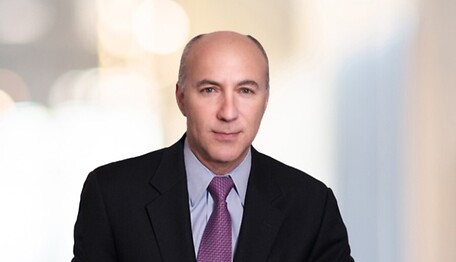New York Court Temporarily Enjoins UCC Foreclosure Sale
New York courts have become a battleground for challenges to foreclosure sales under the Uniform Commercial Code (UCC) amidst the COVID-19 pandemic. Another trial court of the New York State Supreme Court (New York County) issued a preliminary injunction in Shelbourne BRF LLC v. SR 677 Bway LLC, halting a mezzanine lender’s August 19, 2020 UCC foreclosure sale. The decision confirms that the impact of the pandemic on the value of commercial real estate, and upon traditional steps taken to conduct a foreclosure auction, are both key factors that courts will continue to consider in determining whether a UCC foreclosure sale scheduled during the pandemic can be conducted in a commercially reasonable manner as required by the UCC.
THE CASE
In Shelbourne, the mezzanine borrowers owned the membership or equity interests in the companies (collectively, the “Property Owner”) that held title to a 12-story office building in Albany, New York. As security for the $3.35 million mezzanine loan, the mezzanine borrowers pledged their equity interests to the mezzanine lender. In May 2020, the mezzanine lender declared a default under the mezzanine loan as a result of the Property Owner’s default under the $28.5 million senior loan secured by a mortgage against the office building. The mezzanine lender then scheduled a public UCC foreclosure sale of the equity interests in the Property Owner for August 19, 2020. If the sale had been held, the equity interests in the Property Owner (and right to control the Property Owner and office building) would have been transferred to the successful bidder, either the mezzanine lender or a third party purchaser.
The mezzanine borrowers requested that the trial court enjoin the UCC foreclosure sale. Among other claims, they argued that the UCC foreclosure sale could not go forward because the mezzanine lender had cured the default under the senior loan, but the payments under the mezzanine loan had remained current. The mezzanine borrowers also asserted that the UCC sale could not be conducted in a manner to satisfy the commercially reasonable requirement under the UCC due to the pandemic’s adverse effect on the value of the underlying office building.
In response, the mezzanine lender argued, in part, that the 32 days’ advance notice of the scheduled sale, and its pre-sale marketing efforts, including the hiring of a reputable auctioneer to conduct the public sale had satisfied the commercially reasonable standard, and that the court need not enjoin the sale because the borrowers could assert their claims for monetary losses afterwards under the UCC. The mezzanine lender also maintained that the office property was “under-water” before the outbreak of the pandemic because its market value was less than the amount owed under the senior and mezzanine loans.
THE COURT’S RESPONSE
In its decision, the trial court acknowledged that New York Administrative Order of the Chief Administrative Judge of the Courts dated July 23, 2020, preventing commercial and residential foreclosures until October 15, 2020, by its terms, did not apply to the mezzanine lender’s UCC foreclosure sale of the equity interests. Nevertheless, the court stated that the harm to owners of real property facing judicial foreclosures that the moratorium was intended to prevent was the same harm that the mezzanine borrowers were confronting because the value of their equity interests to be auctioned at the UCC foreclosure sale is based on the value of the underlying real property. The trial judge found that holding the UCC foreclosure auction of the equity interests during a pandemic would likely result in bids below the fair market value “due to uncertainty about the continued length and severity of the pandemic.” As a result, the court held that the mezzanine borrowers were likely to prevail on their claim that the proposed sale would not be commercially reasonable under the UCC and enjoined the August 19th UCC foreclosure sale.
Instead of preventing the UCC sale from being rescheduled until the suit concluded (as is customary when preliminary injunctions are entered), the court’s order only enjoined the mezzanine lenders from “noticing or proceeding with” the UCC foreclosure auction before October 15, 2020, consistent with the expiration date of the court’s foreclosure moratorium. In the interim, the judge “urged” the parties to “continue negotiating in good faith to reach an amicable resolution, especially as the value of the property may be much lower than the total amount due on the loans, making a credit bid inevitable.” In doing so, the trial court provided the mezzanine borrowers some ammunition and additional time to work out the mezzanine loan default. At the same time, the mezzanine lender could resume the foreclosure process on October 15th and reschedule the UCC sale well-before year-end, unless the court extends the injunction.
IMPLICATIONS
What are the takeaways or issues raised by the court’s decision? Trial courts are likely to continue on a case-by-case basis to consider the extent to which a UCC foreclosure sale scheduled during the pandemic will satisfy the commercially reasonable test. Mezzanine lenders should take appropriate actions to ensure that their UCC foreclosure sales are difficult to attack as commercially unreasonable. To do so, lenders and their professional sales team should engage in robust marketing efforts and schedule the timing of their UCC sales to attract numerous bidders and to afford them adequate time to perform due diligence in advance of the sale.
The New York trial judges in the Shelbourne suit and the Mark Hotel case temporarily halted UCC foreclosure sales based on their concerns about the borrower’s risk of losses if the UCC sales proceeded during the pandemic which could not be adequately compensated in a post-sale proceeding. While the rulings in both cases were favorable to the mezzanine borrowers, the injunctions were both temporary. The Shelbourne court appeared to telegraph that there were limits to its power to further enjoin the UCC sale, especially if the court later determines that there is no equity in the underlying office property or if the judicial foreclosure moratorium is not extended beyond October 15th.
We expect courts’ assessment of valuation under current market conditions to continue to play heavily into their review of challenges to future UCC foreclosure sales in New York and elsewhere. However, as the pandemic continues and resets the commercial real estate market in the long-term, it will become increasingly difficult for courts to stay UCC foreclosure sales based on perceived “current” value reductions due to the pandemic.
If you have questions please contact Steven E. Ostrow (ostrows@whiteandwilliams.com; 212.714.3068), Timothy E. Davis (davist@whiteandwilliams.com; 215.864.6829), Steven E. Coury (courys@whiteandwilliams.com; 212.631.4412), Kristen E. Andreoli (andreolik@whiteandwilliams.com; 212.631.1256), or another member of our Real Estate and Finance Groups.
As we continue to monitor the novel coronavirus (COVID-19), White and Williams lawyers are working collaboratively to stay current on developments and counsel clients through the various legal and business issues that may arise across a variety of sectors. Read all of the updates here.
PRACTICE AREAS
Practice Areas
KEY ATTORNEYS
-
Managing Partner and Chair of the Executive Committee
-
Partner


